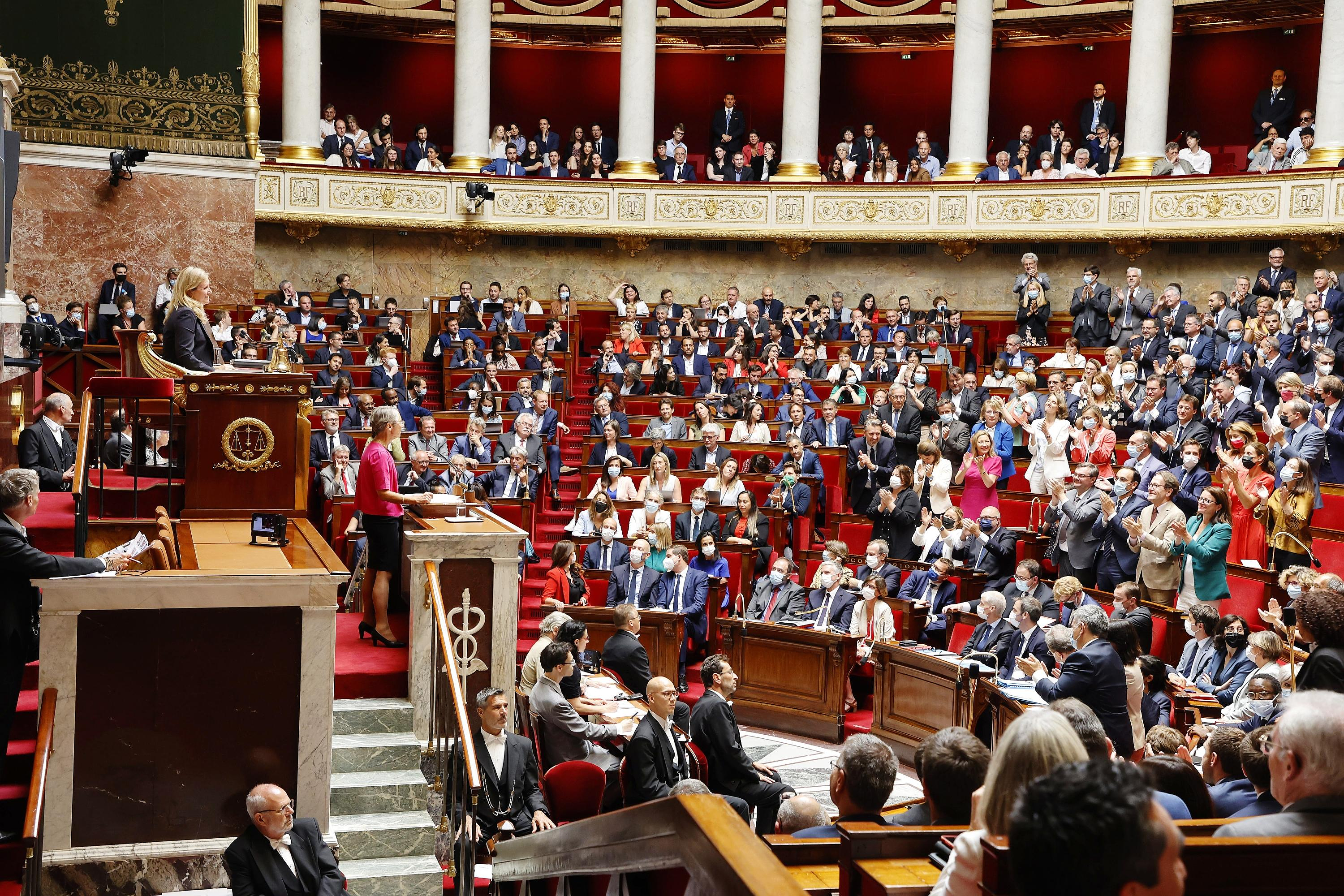It is a rare profile that the immortals have just elected among themselves during the election to chair no. 16 occupied by Valéry Giscard d'Estaing. First remark: Raphaël Gaillard is extremely young for an immortal: he is 48 years old. He is therefore the youngest of the venerable Company. We have to go back to Jean d'Ormesson, elected in 1973 at the age of 48 to the chair of Jules Romans, to find traces of such precocity. Closer to us, they were Erik Orsenna (elected at 51), Jean-Marie Rouart (elected at 54) and Jean-Christophe Rufin (elected at 56), the youngest.
Second remark: normalien, psychiatrist, writer, Raphaël Gaillard, through his profession and his knowledge, will expand the range of characters and qualities that make up the French Academy and its 37 members (there are still three empty chairs). During this election which was held on Thursday April 25 at 4 p.m., he won the vote in the first round, with 15 votes (out of 30 voters). Dominique Chagnollaud de Sabouret obtained two votes, and Éric Dubois, one vote. There were two blank ballots and ten ballots marked with a cross signifying the refusal of all candidates.
It must be said that two weeks ago, we witnessed an event: the sailor Isabelle Autissier, despite being the favorite, withdrew her candidacy for the chair of Giscard d'Estaing. She did not explain her withdrawal. Too bad, because at the French Academy we like elections where strong personalities confront each other (when these elections do not result in a “white election”, that is to say without elected officials).
It is therefore a psychiatrist who comes under the Cupola, Professor Raphaël Gaillard directs the hospital-university psychiatry center of Saint-Anne hospital and the University of Paris. In this, he follows a certain tradition of academic scientists. We remember, among others, professors Yves Pouliquen (ophthalmologist), Jean Bernard (cancerologist) and François Jacob (cellular genetics), Henri Mondor (surgery), Jean Delay (surgery and psychology) and Jean Hamburger (nephrology)… The new elected will sit alongside Professor Jules Hoffmann (integrative biology) and Doctor Jean-Christophe Rufin. Raphaël Gaillard's work on consciousness and unconscious processes has been published in the most prestigious neuroscience and psychiatry journals. He chairs the Pierre Deniker Foundation, which supports research into psychological disorders and works to promote awareness of them among the general public.
Raphaël Gaillard is the author of a highly acclaimed book, which pleases writers as well as scientists, and especially readers, Un coup d'axe dans la tête (Grasset), with a banner which explains the fascinating subject of essay: madness and creativity. It is a question about the link between madness and creativity. The psychiatrist draws on the cases of several patients and recent scientific studies to renew the understanding of psychological disorders and the conditions of artistic creation. A small sign: the essay received the Jacques de Fouchier prize awarded by the Académie française in 2022… In this book, he writes this: “What makes us beings capable of creating? When Diderot writes that “great artists have a little ax in their heads”, he is consecrating an idea that crosses eras and cultures: whether it is melancholy according to Aristotle, the storm of passions according to Romantic or surrealist manifesto, all celebrate the link between madness and creativity, to the point of considering madness as the ordinary of genius. However, the idea hardly resists the daily experience of the psychiatrist, who here tells his patients and shows how much the illness hinders them and leaves them to suffering.
In January 2024, he published Augmented Man: Future of Our Brains (Grasset), a reflection on the future of man facing the advent of artificial intelligence (AI). The psychiatrist and neuroscience researcher addresses the question of the confrontation between machines and humans, transhumanism or even the future with AI. In the words of its publisher: “In this vast fresco which brings science and literature into dialogue, it is notably a question of the neuron of an American star and of Don Quixote, of coffee-addicted writers and the revival of psychedelics, of inconsolable lovers and fruits of the tree of knowledge, Elon Musk's sow and Einstein's nap. Throughout this captivating epic, a revelation: it is finally scientifically demonstrated why reading makes you more intelligent. With such thinking, how could the academicians not be seduced? To date, there are only three seats left to be filled: Jean-Denis Bredin, Hélène Carrère d'Encausse and René de Obaldia.

 Who was Dror Or, the Israeli father who died as a hostage in the hands of Hamas?
Who was Dror Or, the Israeli father who died as a hostage in the hands of Hamas? “Pay in cash”: at his trial, Donald Trump faced with an embarrassing recording
“Pay in cash”: at his trial, Donald Trump faced with an embarrassing recording Italy: a grandmother accidentally serves a bottle filled with wine to a baby, he has an alcoholic coma
Italy: a grandmother accidentally serves a bottle filled with wine to a baby, he has an alcoholic coma The mysterious skeletons of Hermann Göring's villa
The mysterious skeletons of Hermann Göring's villa Children born thanks to PMA do not have more cancers than others
Children born thanks to PMA do not have more cancers than others Breast cancer: less than one in two French women follow screening recommendations
Breast cancer: less than one in two French women follow screening recommendations “Dazzling” symptoms, 5,000 deaths per year, non-existent vaccine... What is Lassa fever, a case of which has been identified in Île-de-France?
“Dazzling” symptoms, 5,000 deaths per year, non-existent vaccine... What is Lassa fever, a case of which has been identified in Île-de-France? Sánchez cancels his agenda and considers resigning: "I need to stop and reflect"
Sánchez cancels his agenda and considers resigning: "I need to stop and reflect" Health carpooling, this source of savings which arouses the ire of patients and taxis
Health carpooling, this source of savings which arouses the ire of patients and taxis Tesla Model 3, MG4 and Dacia Spring.... With the end of the ecological bonus, these electric cars produced in China are seeing their sales fall
Tesla Model 3, MG4 and Dacia Spring.... With the end of the ecological bonus, these electric cars produced in China are seeing their sales fall For the 2024 Olympics, Airbnb commits to fighting prostitution in its accommodation
For the 2024 Olympics, Airbnb commits to fighting prostitution in its accommodation “Shrinkflation”: supermarkets obliged to alert their customers from July 1
“Shrinkflation”: supermarkets obliged to alert their customers from July 1 The electro of Justice and the echoes of Portishead
The electro of Justice and the echoes of Portishead 1924 Olympic Games: according to his daughter, the hero of Chariots of Fire was “not a bigot”
1924 Olympic Games: according to his daughter, the hero of Chariots of Fire was “not a bigot” The “German Brothel” in Yvelines: an uncertain future for the ruined residence
The “German Brothel” in Yvelines: an uncertain future for the ruined residence The eye of the INA: when Paul Auster visited Bernard Pivot
The eye of the INA: when Paul Auster visited Bernard Pivot Omoda 7, another Chinese car that could be manufactured in Spain
Omoda 7, another Chinese car that could be manufactured in Spain BYD chooses CA Auto Bank as financial partner in Spain
BYD chooses CA Auto Bank as financial partner in Spain Tesla and Baidu sign key agreement to boost development of autonomous driving
Tesla and Baidu sign key agreement to boost development of autonomous driving Skoda Kodiaq 2024: a 'beast' plug-in hybrid SUV
Skoda Kodiaq 2024: a 'beast' plug-in hybrid SUV The home mortgage firm rises 3.8% in February and the average interest moderates to 3.33%
The home mortgage firm rises 3.8% in February and the average interest moderates to 3.33% This is how housing prices have changed in Spain in the last decade
This is how housing prices have changed in Spain in the last decade The home mortgage firm drops 10% in January and interest soars to 3.46%
The home mortgage firm drops 10% in January and interest soars to 3.46% The jewel of the Rocío de Nagüeles urbanization: a dream villa in Marbella
The jewel of the Rocío de Nagüeles urbanization: a dream villa in Marbella Facing Jordan Bardella, the popularity match turns to Gabriel Attal’s advantage
Facing Jordan Bardella, the popularity match turns to Gabriel Attal’s advantage Europeans: a senior official on the National Rally list
Europeans: a senior official on the National Rally list Blockade of Sciences Po: the right denounces a “drift”, the government charges the rebels
Blockade of Sciences Po: the right denounces a “drift”, the government charges the rebels Even on a mission for NATO, the Charles-de-Gaulle remains under French control, Lecornu responds to Mélenchon
Even on a mission for NATO, the Charles-de-Gaulle remains under French control, Lecornu responds to Mélenchon These French cities that will boycott the World Cup in Qatar
These French cities that will boycott the World Cup in Qatar Monaco - Clermont: Minamino cornerstone, Fofana essential, the Clermont defense overwhelmed... The tops and the flops
Monaco - Clermont: Minamino cornerstone, Fofana essential, the Clermont defense overwhelmed... The tops and the flops Gymnastics: two gold medals for the Italian Manila Esposito during the European Championships
Gymnastics: two gold medals for the Italian Manila Esposito during the European Championships Champions Cup: in pain, Leinster beats Northampton and qualifies for the final
Champions Cup: in pain, Leinster beats Northampton and qualifies for the final Liga: Real Madrid crowned champion of Spain after FC Barcelona's defeat in Girona
Liga: Real Madrid crowned champion of Spain after FC Barcelona's defeat in Girona


















